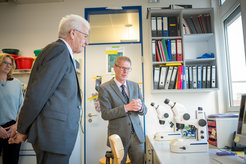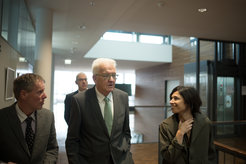Minister President Winfried Kretschmann honors cutting-edge research at the Max Planck Institutes and the Friedrich Miescher Laboratory in Tübingen
Winfried Kretschmann, the Minister President of Baden-Württemberg, Germany, visited the Max Planck Institutes for Biology Tübingen and Biological Cybernetics. During his tour, he commended the outstanding basic research in the natural sciences. He was particularly impressed by the innovative research projects spanning developmental and evolutionary biology, as well as neuroscience.

During discussions with the scientists, Kretschmann praised the innovative spirit of the international research teams, particularly commending the insightful presentations by many young researchers. He showed keen interest in the progress made in researching the brain and the questions of modern biology. “Hardly any other region in Europe has such many research institutions as Baden-Württemberg. Innovations from basic scientific research play a central role in advances in medicine and technology. It is essential that Baden-Württemberg remains a pioneer in the natural sciences,” emphasized the Minister President.
Tour of the Max Planck Campus Tübingen
The tour started with visits to three laboratories in the Max Planck Institute for Biology Tübingen and the Friedrich Miescher Laboratory, where researchers investigate the evolution and development of diverse life forms, including brown algae, fruit flies, and nematodes (microscopic roundworms). These scientists link molecular, genetic and developmental processes at the cellular level to these species' observable traits and behaviours in natural environments.




The tour continued with visits to labs at the Max Planck Institute for Biological Cybernetics, including visits with researchers studying sleep and memory, and advanced neuroimaging of cognition in zebrafish and humans.
In addition to the two Max Planck Institutes for Biology Tübingen and for Biological Cybernetics, and the Friedrich Miescher Laboratory, the Max Planck Campus Tübingen is also home to the Tübingen site of the Max Planck Institute for Intelligent Systems. Around 1,200 people from over 50 nations work on the campus, researching the limits of today's basic understanding of processes in nature and information processing - both in humans and in artificial intelligent systems.
Research of global relevance
The work at the Max Planck Campus not only contributes to the scientific excellence of Baden-Württemberg, but also has far-reaching implications for global issues. From climate research and life in the oceans to neuroscientific advances and the development of intelligent technologies, the knowledge gained here creates the basis for innovations in many areas.
Minister President Kretschmann concluded by emphasizing the importance of science and research for society: “The work of the Max Planck Institutes in Tübingen is a shining example of how basic research can contribute to overcoming numerous global challenges. We are proud to host the Max Planck Institutes, which serve as beacons of international cutting-edge research in Baden-Württemberg. To maintain this excellence, we invest significantly above average in research and development. We have pursued an innovation and future-focused agenda for years across all key technologies, investing approximately seven billion euros in state funding alone since 2014.”
The Minister President's visit was a strong signal of recognition for the scientists and emphasizes the importance of the Max Planck Society's research location in Tübingen as an international centre of scientific excellence.




